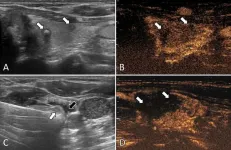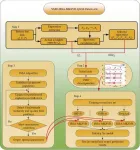(Press-News.org) Changes in the gut microbiome have been implicated in a range of diseases including type 2 diabetes, obesity, and inflammatory bowel disease. Now, a team of researchers at the Broad Institute of MIT and Harvard along with Massachusetts General Hospital has found that microbes in the gut may affect cardiovascular disease as well. In a study published in Cell, the team has identified specific species of bacteria that consume cholesterol in the gut and may help lower cholesterol and heart disease risk in people.
Members of Ramnik Xavier’s lab, Broad’s Metabolomics Platform, and collaborators analyzed metabolites and microbial genomes from more than 1,400 participants in the Framingham Heart Study, a decades-long project focused on risk factors for cardiovascular disease. The team discovered that bacteria called Oscillibacter take up and metabolize cholesterol from their surroundings, and that people carrying higher levels of the microbe in their gut had lower levels of cholesterol. They also identified the mechanism the bacteria likely use to break down cholesterol. The results suggest that interventions that manipulate the microbiome in specific ways could one day help decrease cholesterol in people. The findings also lay the groundwork for more targeted investigations of how changes to the microbiome affect health and disease.
“Our research integrates findings from human subjects with experimental validation to ensure we achieve actionable mechanistic insight that will serve as starting points to improve cardiovascular health,” said Xavier, who is a core institute member, director of the Immunology Program, and co-director of the Infectious Disease and Microbiome Program at the Broad. He is also a professor at Harvard Medical School and Massachusetts General Hospital.
Postdoctoral researcher Chenhao Li and research scientist Martin Stražar, both in Xavier’s lab, were co-first authors on the study.
Cholesterol cues
In the past decade, other researchers have uncovered links between composition of the gut microbiome and elements of cardiovascular disease, such as a person's triglycerides and blood sugar levels after a meal. But scientists haven’t been able to target those connections with therapies in part because they lack a complete understanding of metabolic pathways in the gut.
In the new study, the Broad team gained a more complete and detailed picture of the impact of gut microbes on metabolism. They combined shotgun metagenomic sequencing, which profiles all of the microbial DNA in a sample, with metabolomics, which measures the levels of hundreds of known and thousands of unknown metabolites. They used these tools to study stool samples from the Framingham Heart Study.
“The project outcomes underline the importance of high-quality, curated patient data,” Stražar said. “That allowed us to note effects that are really subtle and hard to measure and directly follow up on them.”
The approach uncovered more than 16,000 associations between microbes and metabolic traits, including one that was particularly strong: People with several species of bacteria from the Oscillibacter genus had lower cholesterol levels than those who lacked the bacteria. The researchers found that species in the Oscillibacter genus were surprisingly abundant in the gut, representing on average 1 in every 100 bacteria.
The researchers then wanted to figure out the biochemical pathway the microbes use to break down cholesterol. To do this, they first needed to grow the organism in the lab. Fortunately, the lab has spent years collecting bacteria from stool samples to create a unique library that also included Oscillibacter.
After successfully growing the bacteria, the team used mass spectrometry to identify the most likely byproducts of cholesterol metabolism in the bacteria. This allowed them to determine the pathways the bacteria uses to lower cholesterol levels. They found that the bacteria converted cholesterol into intermediate products that can then be broken down by other bacteria and excreted from the body. Next, the team used machine-learning models to identify the candidate enzymes responsible for this biochemical conversion, and then detected those enzymes and cholesterol breakdown products specifically in certain Oscillibacter in the lab.
The team found another gut bacterial species, Eubacterium coprostanoligenes, that also contributes to decreased cholesterol levels. This species carries a gene that the scientists had previously shown is involved in cholesterol metabolism. In the new work, the team discovered that Eubacterium might have a synergistic effect with Oscillibacter on cholesterol levels, which suggests that new experiments that study combinations of bacterial species could help shed light on how different microbial communities interact to affect human health.
Microbial messages
The vast majority of genes in the human gut microbiome remains uncharacterized, but the team is confident that their success in pinpointing cholesterol-metabolizing enzymes paves the way for the discovery of other similar metabolic pathways impacted by gut microbes, which could be targeted therapeutically.
“There are many clinical studies trying to do fecal microbiome transfer studies without much understanding of how the microbes interact with each other and the gut,” Li said. “Hopefully stepping back by focusing on one particular bug or gene first, we’ll get a systematic understanding of gut ecology and come up with better therapeutic strategies like targeting one or a few bugs.”
“Because of the large number of genes of unknown function in the gut microbiome, there are gaps in our ability to predict metabolic functions,” Li added. “Our work highlights the possibility that additional sterol metabolism pathways may be modified by gut microbes. There are potentially a lot of new discoveries to be made that will bring us closer to a mechanistic understanding of how microbes interact with the host.”
Funding:
This work was supported by the National Institutes of Health.
Paper cited:
Li C, Stražar M, et al. Gut microbiome and metabolome profiling in Framingham Heart Study reveals cholesterol-metabolizing bacteria. Cell. Online April 2, 2024. DOI:10.1016/j.cell.2024.03.014.
About Broad Institute of MIT and Harvard
Broad Institute of MIT and Harvard was launched in 2004 to empower this generation of creative scientists to transform medicine. The Broad Institute seeks to describe the molecular components of life and their connections; discover the molecular basis of major human diseases; develop effective new approaches to diagnostics and therapeutics; and disseminate discoveries, tools, methods and data openly to the entire scientific community.
Founded by MIT, Harvard, Harvard-affiliated hospitals, and the visionary Los Angeles philanthropists Eli and Edythe L. Broad, the Broad Institute includes faculty, professional staff and students from throughout the MIT and Harvard biomedical research communities and beyond, with collaborations spanning over a hundred private and public institutions in more than 40 countries worldwide.
END
Scientists link certain gut bacteria to lower heart disease risk
Study finds several species of cholesterol-metabolizing bacteria in people with lower cholesterol levels
2024-04-02
ELSE PRESS RELEASES FROM THIS DATE:
Gene analysis generates spatial map of intestinal cells and traces their trajectories during gut inflammation
2024-04-02
Cells within the intestines perform various roles including nutrient absorption, sensing, and maintaining homeostasis. Certain chronic disorders are distinctly characterized by gut inflammation, which disrupts intestinal cells and can lead to a remodeling of the gut and the introduction of new immune cells. To better understand the types of cells and their positioning within the intestines, researchers at Brigham and Women’s Hospital, a founding member of the Mass General Brigham healthcare system, in collaboration with investigators ...
Gloom and doom warnings about climate change do not work
2024-04-02
If you want to spread a message about climate change and global warming, you need to adapt the message according to your intended audience and what you want to achieve.
Researchers have now developed an app to help people who want to spread their message on climate issues to ensure they generate the most support possible – be they researchers, politicians, various decision makers or legislators.
Huge survey involving 63 countries
59,000 people participated in surveys as part of the work on creating the app, and Norway was among ...
The 2024 Career Optimism Index® study highlights shift from the great resignation to a great talent stagnation – and how employers can break through
2024-04-02
Today the University of Phoenix Career Institute® released its 2024 Career Optimism Index®, a comprehensive study examining the state of American workers' career trajectories and sentiments about the future of their job and career opportunities. This year's Index, the fourth consecutive year it has been fielded, reveals that workers and employers are facing a critical moment of talent stagnation in the workplace.
More than half (53%) of Americans report feeling easily replaceable in their job position and 64% of workers say their company does not offer opportunities ...
Minimally invasive procedure may spare patients from thyroid surgery
2024-04-02
OAK BROOK, Ill. – In a 10-center study, microwave ablation offered progression free survival rates and fewer complications than surgery in the treatment of a form of thyroid cancer known as papillary thyroid carcinoma (PTC), according to research published today in Radiology, a journal of the Radiological Society of North America (RSNA).
The most common type of thyroid cancer, PTC often presents with multifocality, meaning that two or more bumps or nodules (papillae) are found within the thyroid gland. The occurrence of multifocality within PTC cases is notably frequent, ranging between approximately ...
Noted UCLA neurologist Dr. Rhonda Voskuhl wins 2024 John Dystel Prize for multiple sclerosis research
2024-04-02
[New York, April 2, 2024] – Rhonda Voskuhl, M.D., an internationally recognized neurologist and investigator at the University of California, Los Angeles, is the winner of the 2024 John Dystel Prize for Multiple Sclerosis Research. She is being recognized for her innovative research to understand mechanisms underlying sex differences in multiple sclerosis (MS) and advancing women’s health.
Women are much more susceptible than men to developing MS, an immune-mediated neurological disease. Voskuhl has conducted extensive basic and clinical research ...
Novel vaccine, PfSPZ-LARC2 Vaccine, to prevent malaria infection developed by Seattle Children’s Research Institute and Sanaria ready for human testing
2024-04-02
April 2, 2024 – In a report published on March 21, 2024 in EMBO Molecular Medicine (A replication competent Plasmodium falciparum parasite completely attenuated by dual gene deletion) investigators at Seattle Children’s Research Institute and Sanaria Inc. describe the development of a whole malaria parasite vaccine strain that infects the liver, develops to the late liver stage, and then gets completely stuck and cannot burst out of the liver to cause symptomatic blood infection. The creation of this strain called LARC2 (Late liver-stage Arresting, Replication Competent) was accomplished by deletion of only two parasite genes out of the approximately 5,000 in the ...
A hybrid data driven framework considering feature extraction for battery state of health estimation and remaining useful life prediction
2024-04-02
A paper proposing a hybrid data driven framework considering feature extraction for battery state of health estimation and remaining useful life prediction was published in the journal Green Energy and Intelligent Transportation on 29 March 2024.
VMD is used for completely non-recursive modal variation to deal with signals. The optimal solution of the variational problem is obtained finally by effective decomposition component of the given signal. By iteration, the VMD algorithm can decompose the signals into some intrinsic ...
Press passes available now for NUTRITION 2024 to be held June 29–July 2
2024-04-02
Complimentary press passes are now available for NUTRITION 2024, the annual flagship meeting of the American Society for Nutrition. Join us June 29–July 2 in Chicago for the latest developments in nutrition research, practice and policy.
As the pre-eminent meeting in nutrition science, NUTRITION attracts thousands of scientists, practitioners, policymakers, advocacy leaders and industry professionals each year. Reporters are invited to attend in person to connect with the field’s leaders and learn about exciting scientific ...
UMass Amherst-led team creates biofilm-resistant glass for marine environments
2024-04-02
AMHERST, Mass. – A group of researchers led by University of Massachusetts Amherst engineers have created ultraviolet (UV) rays-emitting glass that can reduce 98% of biofilm from growing on surfaces in underwater environments, as reported in the journal Biofilm.
Biofilm is a slimy layer of various types of microorganisms that grows on wet surfaces. “If you look down your sink and touch the inner side of it—that slimy substance is biofilm,” describes Mariana Lanzarini-Lopes, ...
Heart health declines rapidly after menopause
2024-04-02
A woman’s cardiovascular risk can rise sharply after she goes through menopause, quickly catching up to men of a similar age and health profile, according to new findings presented at the American College of Cardiology’s Annual Scientific Session. Researchers said the study underscores the importance of recognizing and addressing early warning signs of heart disease risk in women as they lose the protective effects of estrogen after menopause.
“This is a unique study cohort of only post-menopausal ...
LAST 30 PRESS RELEASES:
Emerging class of antibiotics to tackle global tuberculosis crisis
Researchers create distortion-resistant energy materials to improve lithium-ion batteries
Scientists create the most detailed molecular map to date of the developing Down syndrome brain
Nutrient uptake gets to the root of roots
Aspirin not a quick fix for preventing bowel cancer
HPV vaccination provides “sustained protection” against cervical cancer
Many post-authorization studies fail to comply with public disclosure rules
GLP-1 drugs combined with healthy lifestyle habits linked with reduced cardiovascular risk among diabetes patients
Solved: New analysis of Apollo Moon samples finally settles debate about lunar magnetic field
University of Birmingham to host national computing center
Play nicely: Children who are not friends connect better through play when given a goal
Surviving the extreme temperatures of the climate crisis calls for a revolution in home and building design
The wild can be ‘death trap’ for rescued animals
New research: Nighttime road traffic noise stresses the heart and blood vessels
Meningococcal B vaccination does not reduce gonorrhoea, trial results show
AAO-HNSF awarded grant to advance age-friendly care in otolaryngology through national initiative
Eight years running: Newsweek names Mayo Clinic ‘World’s Best Hospital’
Coffee waste turned into clean air solution: researchers develop sustainable catalyst to remove toxic hydrogen sulfide
Scientists uncover how engineered biochar and microbes work together to boost plant-based cleanup of cadmium-polluted soils
Engineered biochar could unlock more effective and scalable solutions for soil and water pollution
Differing immune responses in infants may explain increased severity of RSV over SARS-CoV-2
The invisible hand of climate change: How extreme heat dictates who is born
Surprising culprit leads to chronic rejection of transplanted lungs, hearts
Study explains how ketogenic diets prevent seizures
New approach to qualifying nuclear reactor components rolling out this year
U.S. medical care is improving, but cost and health differ depending on disease
AI challenges lithography and provides solutions
Can AI make society less selfish?
UC Irvine researchers expose critical security vulnerability in autonomous drones
Changes in smoking status and their associations with risk of Parkinson’s, death
[Press-News.org] Scientists link certain gut bacteria to lower heart disease riskStudy finds several species of cholesterol-metabolizing bacteria in people with lower cholesterol levels




